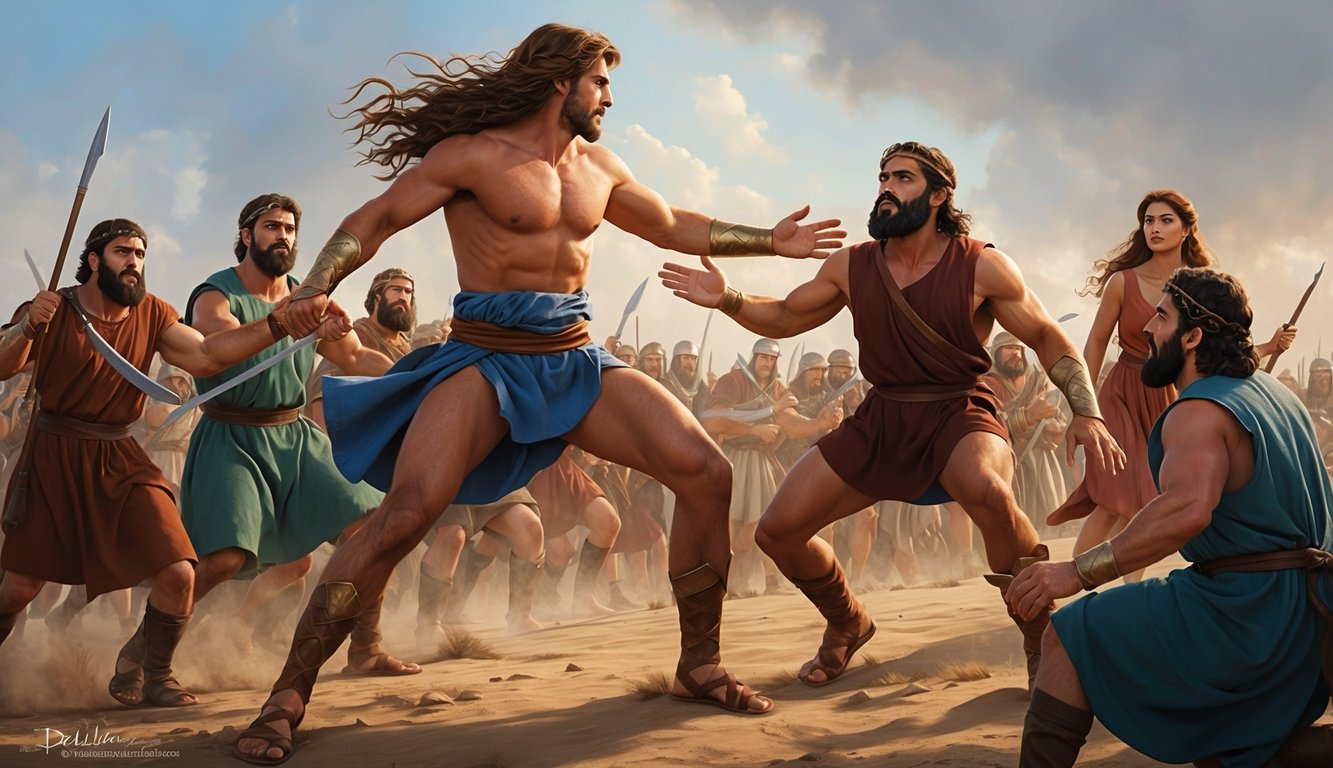Don’t Miss Out On This Unique Astrological Opportunity
Are you tired of spinning your wheels and getting nowhere? Simply put, you’re out of sync: you’re out of alignment with your astral configuration.
But: there’s a kind of map that can help you reclaim your alignment. Think of it as your own personal blueprint to success and happiness: a blueprint that will help you live your most amazing life.
Get started here.
The story of Samson and Delilah is one of the most captivating tales in the Bible.
Found in the Book of Judges, it tells of Samson, a legendary Israeli warrior, whose immense strength was famously tied to his uncut hair. This narrative explores themes of trust, betrayal, and the consequences of vulnerability.
Imagine a time when power could be bought with secrets, and love could lead one to betrayal.
That’s the world of Samson and Delilah, where Delilah discovers the secret of Samson’s strength and uses it to hand him over to his enemies.
This tale is not just about physical strength; it’s about the inner battles each person faces.
Movies and literature often revisit the story of Samson and Delilah.
These adaptations, such as Cecil B. DeMille’s 1949 film, show the enduring allure of this story.
By retelling it, they delve into the complexities of love and the struggles between personal desires and moral duties.
Delving into these themes reveals why the story still resonates deeply today.
Historical Background

When you explore the story of Samson and Delilah, it’s important to understand both the biblical context and the political landscape of the time.
These elements shed light on the tensions between Israel and the Philistines.
Biblical Context
The story of Samson is found in the book of Judges, which is part of the Old Testament.
Samson is an Israelite from the Tribe of Dan and is known as a judge of Israel.
He is unique because he was born as a result of a divine promise from an Angel of God.
This angel announced that Samson would begin to rescue Israel from the Philistines’ control.
As a Nazirite, Samson had vows that included never cutting his hair, which was a source of his immense strength.
His life story includes legendary exploits against the Philistines.
These feats demonstrate his pivotal role in the biblical narrative.
Samson’s relationship with Delilah, who is often portrayed as a Philistine, plays a crucial part in his downfall.
Philistine Dominance
During the period when Samson lived, the Philistines held significant power over certain parts of Israel.
They were known for their advanced weapons and strategic coastal cities.
Their dominance posed a constant threat to the Israelites, who were trying to settle more securely in the promised land.
Samson’s actions against the Philistines are seen as part of a larger struggle between these two groups.
His various confrontations with the Philistines highlight the tension and conflict of the era.
The Philistines’ attempts to control and influence the region often clashed with Israel’s desire for independence and devotion to God.
Delilah’s role in this power struggle adds layers to the historical and cultural backdrop of this story.
The Story of Samson and Delilah
In the biblical tale, Samson is known for his incredible strength, while Delilah is remembered for her betrayal.
Together, their story explores themes of faith, power, and loyalty.
Samson’s Birth and Nazirite Vows
Samson’s story begins with a miraculous birth.
His mother, who was barren, received a divine message from an angel announcing that she would have a son.
This son was to be a Nazirite, meaning he was dedicated to God from birth.
Nazirites took vows that included abstaining from alcohol, avoiding contact with dead bodies, and not cutting their hair.
Samson’s uncut hair was a symbol of his dedication and a source of his strength.
His life was set apart for a unique purpose, and these vows were central to his identity and mission.
Samson’s Feats of Strength
You might find Samson’s acts of strength almost unbelievable.
He faced the Philistines, a powerful enemy of Israel, with immense power.
One story describes how he killed a lion with his bare hands.
Another tells how he defeated a thousand Philistines using just the jawbone of a donkey.
He also caused havoc in Gaza by tearing down the city gates and carrying them to a hill.
His strength made him a revered figure and a formidable opponent to the Philistines.
Delilah’s Betrayal
Delilah’s role in the story is pivotal.
Living in the Valley of Sorek, she was approached by the Philistines who offered her money to find the secret of Samson’s strength.
After some coaxing, Samson revealed that his strength lay in his uncut hair, a sign of his Nazirite vow.
Delilah took advantage of this knowledge.
As Samson slept, she had his hair cut, leading to his capture by the Philistines.
They blinded him and took him to Gaza.
In a final act of strength, Samson destroyed the temple of the Philistines, pulling down the pillars, which led to his death and the demise of many Philistines as well.
Character Analysis

In the story of Samson and Delilah, each character plays a crucial role in the unfolding narrative.
The interactions and motivations of Samson, Delilah, and the secondary characters provide insight into themes of faith, betrayal, and strength.
Samson the Nazirite Judge
Samson holds a unique position as a Nazirite judge chosen by God, marked by his immense strength and distinct vows.
From birth, he was set apart for divine purpose.
His strength was legendary, but it was deeply tied to his Nazirite vow, which included not cutting his hair.
This connection makes him both a symbol of Israel’s potential strength and its vulnerabilities.
Samson’s decisions often reflect a struggle between his divine mission and personal desires.
His encounters with Philistine women, whose allure frequently drew him away from his commitments, showcase his weaknesses.
Over time, these weaknesses led Samson into precarious situations, eventually contributing to his downfall.
Delilah: Motivations and Character
Delilah is often remembered for her role in betraying Samson.
Her motivations appear complex, intertwining personal ambition and cultural pressures.
Although her relationship with Samson seemed intimate, it was marked by manipulation.
She used her charm to discover the secret of Samson’s strength, driven by promises of wealth and favor from the Philistine leaders.
Her actions illustrate a theme of betrayal.
Despite her apparent affection, Delilah’s primary loyalty was to the Philistines.
Understanding her motivations adds depth to her character, revealing how societal and personal factors influenced her betrayal.
Secondary Characters
Secondary characters like Samson’s parents and the Philistines add layers to the narrative.
Manoah, Samson’s father, represents faith and dedication to God.
His hopes for Samson underscore the expectations placed upon the latter from a young age.
The Philistines, central to the plot, serve as both adversaries and influencers.
Their interactions with both Samson and Delilah create tension and drive the story forward.
These characters contribute to the overarching themes of divine will and human frailty, enriching the tale of Samson and Delilah with complexity and depth.
Cultural and Artistic Legacy
Samson and Delilah has influenced various forms of art and culture over the years.
From paintings to films, the story captures themes of love, betrayal, and strength, leaving a lasting impact on artists and filmmakers alike.
Art and Literature
The biblical tale of Samson and Delilah has inspired countless pieces of art and literature throughout history.
One notable interpretation is by the painter Peter Paul Rubens, whose depiction showcases the drama and emotion of the story.
This painting highlights the intense moment of betrayal with vivid details and strong contrasts.
In literature, Russian author Vladimir Jabotinsky penned a novel that offers a unique perspective on the legendary tale.
Such works explore the themes of power and passion, engaging readers with the rich storytelling of the Bible.
Samson and Delilah in Film
Film adaptations of Samson and Delilah offer a fresh perspective on the ancient story.
Cecil B. DeMille’s 1949 version is among the most famous, starring Hedy Lamarr and Victor Mature.
DeMille’s production is notable for its grand sets, costumes, and special effects, which bring the biblical story to life.
The film captures the essence of the tale, highlighting the power struggles and emotional depth of the characters.
It remains a significant cultural artifact, illustrating the enduring influence of this biblical narrative on popular media.
Themes and Analysis

Samson and Delilah is a tale that explores important themes like strength, trust, and redemption.
These themes are woven into a narrative that highlights the complexity of human emotions and actions.
Strength and Weakness
In the story of Samson, his immense strength is his defining trait.
His power, granted through his Nazirite vows, allowed him great victories over the Philistines.
Yet, his strength is closely tied to his weakness.
Despite his physical power, Samson’s vulnerability to Delilah’s charms ultimately leads to his downfall.
When she discovers that his strength lies in his uncut hair, she uses this knowledge to betray him.
Delilah cuts Samson’s hair, stripping him of his strength.
This act not only symbolizes human frailty but also reminds you that true strength can be undermined by personal weaknesses and poor judgment.
Vengeance and Redemption
Vengeance is a driving force for Samson.
His actions against the Philistines are often motivated by revenge, such as when he uses the jawbone of a donkey to exact his fury.
Yet, the story also makes room for redemption.
After being captured and blinded by the Philistines, Samson is put to labor in prison, grinding grain.
In his final moments, Samson’s hair begins to grow back, symbolizing a return of his strength.
During a Philistine celebration, he calls upon God, pulling down the temple and defeating his enemies, achieving redemption through one last act of strength.
This moment highlights how even flawed individuals can find redemption.
This story serves as a reminder that perseverance and faith can lead to redemption, even after moments of weakness.
Samson’s final act not only secures his legacy but also demonstrates the power of faith in overcoming adversity.
His journey encourages believers to seek God’s glory in daily life, recognizing that even in failure, there is an opportunity for renewal and purpose.
Betrayal and Trust
The relationship between Samson and Delilah is marked by profound betrayal.
Samson trusts Delilah with the secret of his strength, believing in her loyalty.
Unfortunately, Delilah trades this trust for silver, agreeing to betray him to the Philistines.
This betrayal has significant consequences, showing how misplaced trust can lead to devastating results.
The actions of both characters serve as a cautionary tale about the importance of discernment in relationships.
They remind you to consider loyalty and motives carefully in friendships and partnerships.



